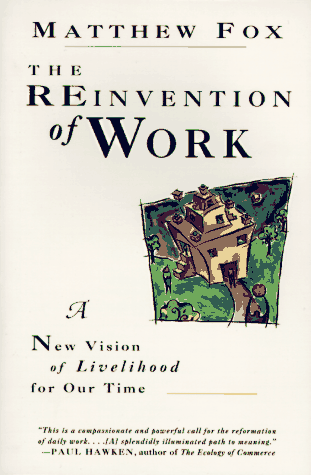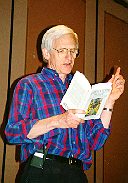
-
The Re-invention of Work
- ON ASKING DEEPER QUESTIONS OF WORK
Today close to one billion human beings are out of work. In the United States alone more people are unemployed than at any time since the Great Depression. In the European Common Market countries, official unemployment is approaching 13 per cent. In the so-called Third World countries, as well as pockets of American inner cities, Indian reservations, and in Ireland, unemployment ranges from 40-60%.At the same time, in the whole industrial world, a large number of persons are overworked; they are "worked" instead of working, giving rise to the new addiction of workaholism.
And of those who are employed, some work in jobs that are inimical to the health of our species and the planet, such as tearing down the rainforests, killing endangered species, selling drugs, or making armaments.
Some politicians, looking for a quick fix, shout that we need "jobs, jobs, jobs." But such simplistic slogans do not cut deeply enough. They avoid the deeper questions that must be asked of work at this critical juncture of human and earth history.
We are being challenged to change the ways we define work, the way we compensate work, the ways we create work, the ways we let go of work and learn to infuse it with play and ritual.
- ON UNEMPLOYMENT
Where does unemployment come from ? It comes from the same place that poverty comes from: social structures and ideologies that lead relationships to fail. Our unemployment crisis is a novelty of modern civilisation.All our work worlds, from the so-called blue collar to the professional, have been tainted by the limits of our civilisationís philosophy of work. The failed relationships of that civilisation are now coming home to haunt us.
Unemployment is not natural to the universe, and it is unhealthy. That we settle for unemployment especially when there is so much good work to be done, points up the fact that we do not live in a healthy world. We can bring about an awakening of our imaginations, which will, in turn, free us to reinvent work, create good work, cease compulsive and addictive work, and create possibilities of work for others.
Wherever there are people, there are needs to be met and thus work to be done. We need to eat, to be clothed, to be educated, to be treated with affection, to be played with. We need laughter and purpose and healing. We need to be invited to stretch our minds, hearts and imaginations.... we need these things far more than we need thirty brands of toothpaste or forty styles of watches. If we paid attention to these basic needs, we would have work for everyone.
- ON WHY LOSING JOBS IS NOT THE END OF THE WORLD
We are indeed homo faber, a species content only if we have work. But the jobs we do don't always fulfil our dreams. And when our work lacks dignity, so do we.The lesson from the Industrial revolution is this: work is not primarily about factories and industries. The human species has always worked, long before the industrial revolution there was plenty of work for humans. Losing one's job today needn't seem like the end of the world, for there is so much new work that needs doing.
When people lament the loss of the competitive edge in the car industry to Japan and elsewhere, another question arises: What work might we do and be trained to do that is more useful at this time for our people? After all, the world hardly needs more automobiles. Cars are destroying our air and ozone protection layers and therefore endangering the future. The loss of dominance in some industries might be a blessing in disguise, freeing us up for much more pressing work in our time.
- ON THE DIFFERENCE BETWEEN A JOB AND YOUR WORK
Jobs are to work as leaves are to a tree. If the tree is ailing the leaves will fall. Fiddling with leaves is not going to cure an ailing tree; just as one cures an ailing tree by treating its roots, so we cure the crisis in work by treating the root meaning and purpose of work. We make jobs by strengthening our view of work, not just by pasting leaves onto a tree. A critical understanding of work will give birth to jobs ...We should not allow ourselves to be deceived that today's crisis in jobs is just about more jobs; it is not. The jobs crisis is a symptom of something much deeper: a crisis in our relationship to work and the challenge put out to our species today to reinvent it.
We must learn to speak of the difference between a job and work. We may be forced to take a job serving food at a fast-food place for $4.25 an hour in order to pay our bills, but work is something else. Work comes from the inside out; work is an expression of our soul, our inner being. It is unique to the individual; it is creative. Work is that which puts us in touch with others at the level of service in the community.
- ON WORK AND YOUTH
The earth's population is growing younger and younger while those making decisions about lifestyle, income distribution, job creation, military investment, and religion are growing older and older. As far as we know, the present generation of young people in the US is poorer, as compared to their elders, than any generation in the history of our species. And what is more, they will inherit the most polluted planet that our species has ever beheld. Furthermore, they will inherit a greater financial debt than any other generation. This means services will be cut and the young will be paying the bills for those elders whose avarice has known no limits.We must become truly critical of the systems that keep so many out of touch with justice and economic fairness. Healthy work lies at the heart of the remedy for this failed promise.
- ON WORK AND EDUCATION
When people lack work they lack pride, they lack an opportunity to return their unique gift to the community... Those who are living in ghettoes tell me that the young need jobs more than they need education. Once they get work their self-esteem can be restored and then they see the value of education. When work is denied a people, hope is the first casualty. The goals of education -- to better people and to encourage conscientious citizenship -- cannot be realised in a situation of unemployment and the despair that accompanies it.- ON WORK AND THE ENVIRONMENTAL CRISIS
The environmental crisis furnishes us with an opportunity and a responsibility to ask deeper questions of work. It also clearly opens the door for inventing new kinds of work -- work that will develop sustainable energy, sustainable agriculture, and sustainable minds and spirits.Ours is a time for the emergence of totally new forms of work. The decline of defence industry, understood as war making, can make way for a defence industry whose task is to protect the Earth. This calls for: tree planting, soil preservation, water purifying, air cleaning, recovery of streams in cities, and recycling of wastes.

Source - Mathew Fox "The Reinvention of Work : A New Vision of Livelihood for our time." (1994) pub by HarperCollins

Top of Page
This Letter's Main Page
Stats | Subscribe | Index |
The Jobs Letter Home Page | The Website Home Page
jrt@jobsletter.org.nz
The Jobs Research Trust -- a not-for-profit Charitable Trust
constituted in 1994
We publish The Jobs Letter - ON UNEMPLOYMENT
Mathew Fox on a New Vision of Livelihood in Our Time.
from The Jobs Letter No.26 / 16 October 1995

Mathew Fox is better known as a radical priest and theologian whose 'creation spirituality' was not welcomed by traditionalists within his Dominican order and the Vatican. His book on a 'new vision of livelihood in our time' reflects his religious background and is heavily laden with the views of mystics, saints and comparative religion on the subject of work. The book however is also an eloquent plea for healing the place of work within our society, and a challenge for us to change the ways we define work, the ways we compensate it, and the ways we let go of it. We feature here some of the essential issues raised in Fox's book.








